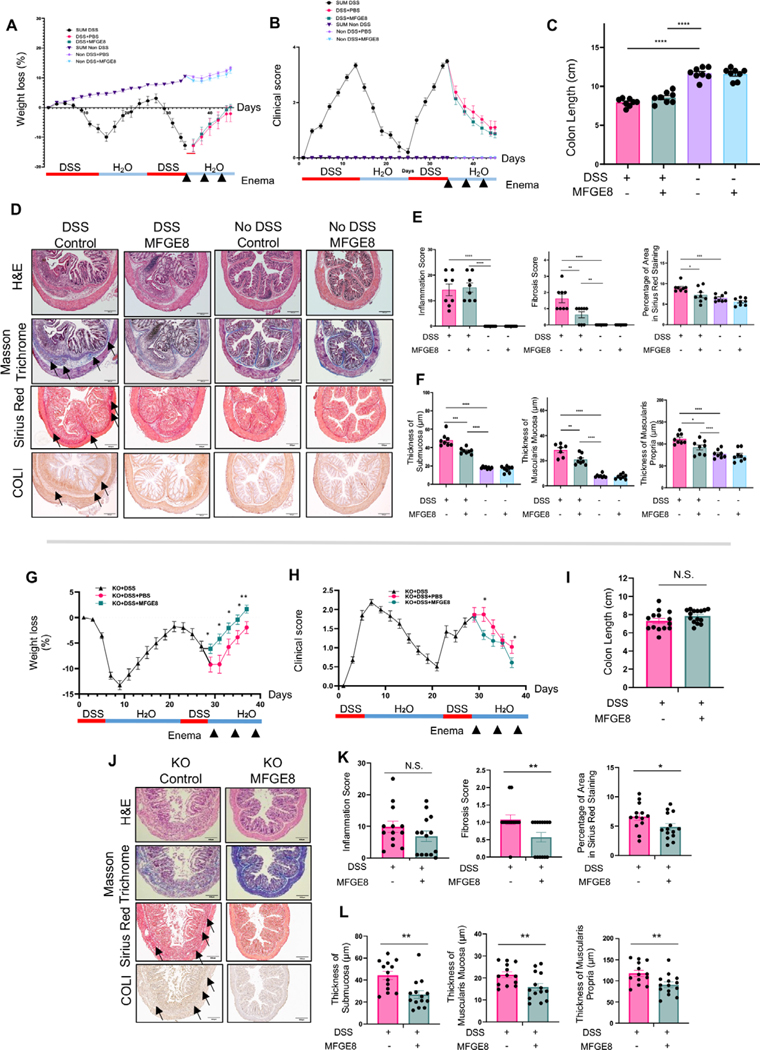Figure 7.
Milk fat globule-epidermal growth factor 8 (MFGE8) reverses fibrosis but does not affect inflammation in chronic dextran sodium sulfate (DSS)-induced colitis. (A–F) Chronic DSS colitis was induced in Balb/C mice by two cycles of 3.5% DSS administration and recovery. 3600 ng or recombinant mouse MFGE8 or vehicle control was applied as enema every 4 days starting from the end of the second cycle of DSS administration (therapeutic administration in already established fibrosis). The severity of DSS-induced colitis was evaluated by measuring (A) body weight loss and (B) the clinical score consisting of blood in stool, weight loss and stool consistency. The therapeutic administration of MFGE8 did not affect weight loss and clinical score. (C) Colon length was not changed in MFGE8-treated and DSS-exposed mice compared with DSS alone. (D) Representative images from mouse colon sections stained with H&E, Masson’s trichrome (MT), sirius red (SR) and collagen I (COLI). Slides are representative of n=8 per group. Arrows point towards the area of fibrosis. (E) Inflammation score was determined by an IBD pathologist in a blinded fashion using H&E sections. There was no difference in DSS-treated animal irrespective of exposure to MFGE8 or not. Fibrosis score as determined by an IBD pathologist in a blinded fashion using MT sections and automatic quantification using SR sections was analysed. MFGE8 reduced the fibrosis score and per cent Sirius red area in DSS-exposed animals. (F) MFGE8 reduced the thickness of the submucosa, muscularis mucosa and muscularis propria in DSS-exposed animals. Data are presented as mean±SEM (n=8 per group from two independent experiments). *, p<0.05; **, p<0.01; ***, p<0.001; ****, p<0.0001. Next, chronic DSS colitis was induced in MFGE8 knockout (KO) mice by two cycles of 3% DSS administration and recovery. 3600 ng mg of recombinant MFGE8 or vehicle control was applied as enema every 4 days starting from the end of the second cycle of DSS administration (MFGE8 rescue in already established fibrosis). The severity of DSS-induced colitis was evaluated by measuring (G) body weight loss and (H) calculating the clinical score consisting of blood in stool, weight loss and stool consistency. MFGE8 KO mouse receiving MFGE8 has a lower weight loss and improved clinical score. (I) Colon length in MFGE8 KO mice was not different when MFGE8 was administered. (J) Representative images from mouse colon sections stained with H&E, MT, SR and COLI. Slides are representative of n=14 per group. (K) Inflammation score was determined by an IBD pathologist in a blinded fashion using H&E sections. When exposed to MFGE8, MFGE8 KO mice showed no difference in inflammation score compared with untreated mice. Fibrosis score as determined by an IBD pathologist in a blinded fashion using MT sections and automatic quantification using SR sections was analysed. MFGE8 administration to MFGE8 KO mice reduced the fibrosis score and per cent sirius red area compared with untreated MFGE8 KO mice. (L) MFGE8 KO mice receiving MFGE8 had a reduced thickness of the submucosa, muscularis mucosa and muscularis propria compared with untreated MFGE8 KO mice. Data are presented as mean±SEM (n=14 per group from two independent experiments). (M) Integrin β5 on immunohistochemistry is increased in chronic DSS fibrosis compared with no DSS (n=5 per group). *, p<0.05; **, p<0.01; ***, p<0.001; ****, p<0.0001. DSS, dextran sodium sulfate; MFGE8, milk fat globule-epidermal growth factor 8; PBS, phosphate-buffered saline; COLI, collagen I; NS, not significant.

